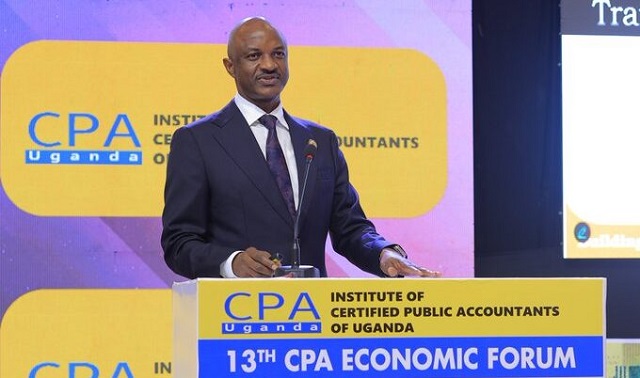
Kampala, Uganda | THE INDEPENDENT | Uganda has the ability to grow the size of its economy 10 times in the next 15 years, but things have to be done differently, including clearing the mess that characterizes all corners, according to Ramathan Ggoobi, the Permanent Secretary at the Ministry of Finance, Planning and Economic Development.
The Secretary to the Treasury decried the way Ugandans, including those in leadership positions, handle vital aspects of the country and the economy, saying the country cannot develop unless it is cleared of the mess it is in. He is, however, confident that the government has put in place structures, including critical investment areas, that are capable of driving this growth, including the ATMS (Agriculture, Tourism, Minerals, including oil and gas, and their enablers; science, technology, and innovations.
He outlined the expected outcomes of the strategy, including a 20 Billion Dollar export plan that includes value addition as well as the tourism earnings that should reach 50 billion by 2040.
He was speaking at the 13th CPA Economic Forum under the theme: Sustainable Economic Growth: Transforming Today, Thriving Tomorrow, organized by the Institute of Certified Public Accountants (ICPAU).
He acknowledged that many Ugandans are still considered poor, having failed to move out of the poverty they were born into, but said, those who could live up to 2040 would enjoy a different Uganda.
But, the PSST made it clear that Uganda’s economic growth is intentional, with projections to return to 7 percent GDP growth this financial year and double-digit rates by 2030, with the trajectory anchored in bold policy decisions and strategic planning.
“This transformation is not just about numbers. It’s about preparing our people, institutions, and infrastructure for global competitiveness, he said, adding, “Sustainable growth begins with a healthy, empowered population.”
He stressed that unless those things, including the “chaos in the cities,” the roads, and others, are changed for the better, the growth strategies will not be achieved, giving the example of the importance of an organised country to attracting quality tourists.
Uganda aims to grow merchandise exports from 17 percent to 30 percent of GDP by 2030, with foreign direct investments reaching 4 Billion Dollars, but Ggoobi said the country must double down on production, trade infrastructure, and regional competitiveness.
Speaking on the role of the accountants in growing a sustainable economy, David Timothy Ediomu, the new president of the ICPAU Council, called on the government to improve the pay for accountants in the civil service to reduce the income gaps among the professionals in the different sectors.
He said, the wide salary discrepancies between them and those in parastatals and private practice was one of the factors that affect sustainable economic growth.
The 13th edition of the Economic Forum focused on sustainability, economic resilience, and the future of the profession. In his remarks, CPA Derick Nkajja, CEO of ICPAU, called for close cooperation between the accountants’ body and Uganda Revenue Authority, especially if the URA is to effectively implement the new amendments to the tax laws. He also emphasized the Institute’s commitment to driving conversations that shape policy, practice, and purpose.
***
URN
 The Independent Uganda: You get the Truth we Pay the Price
The Independent Uganda: You get the Truth we Pay the Price





